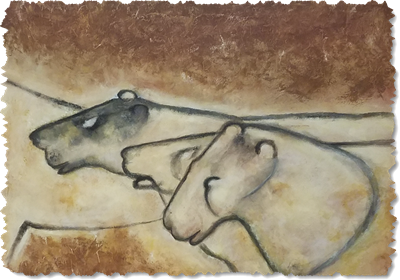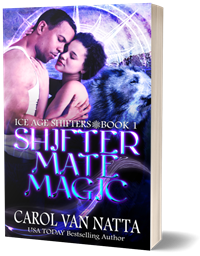Ancient Horses, New Horses
Ancient Horses, New Horses
Humans (and some dogs) love digging around in the dirt. We never know what we'll find—roots, rocks, earthworms, buried treasure, a 42,000-year-old foal from an ancient horse species…
In Siberia, scientists found a foal preserved in the permafrost. Under the right conditions, cold can preserve a lot of things, including humans, but this foal is special. It still has liquid blood. This news story caught my eye, of course, because I write a paranormal romance series that includes some rare shapeshifters who can become extinct Ice Age ancestors of modern animals.
If this were the movies, we'd extract the DNA and make a clone… except, we can't, because red blood cells don't contain a nucleus, where all that fascinating genetic information is stored.
That isn't stopping Russian scientists, however. These are the same folks who found a woolly mammoth and have been trying to clone it, as described in a 2014 Smithsonian TV special. Finding un-degraded DNA is a needle-in-a-haystack problem. And that's just the first step on a long and largely untested road for developing a viable zygote of an extinct animal. From ancient horses, new horses arose, but by evolution, not because we invented test tubes.
Okay, these aren't ancient horses, but they're equally extinct
Ice Age lions that probably hunted them for dinner
Just Because We Can
We learn from every effort. Failure isn't fun at the time, but it's informative. If nothing else, it tells us what not to do. History is replete with thrilling tales of humans stubbornly trying things for months, years, or lifetimes, and finally achieving the hypothesized result. None of this takes into consideration whether we should achieve the desired result. Nor does it tell us who should be making that judgment. Politicians? Priests? Popular vote?
Cloning extinct animals could be a way to recover species we humans have so carelessly exterminated, such as by habitat destruction or outright killing (check out the passenger pigeon or the Tasmanian tiger, for example). But it could introduce new-old exotics into an already fragile ecosystem, or bring back big, hungry dinosaurs that escape from their island…
Ethics is an ephemeral hill to stand on, and often takes hindsight to make an informed decision. It's no longer considered ethical to enslave humans for any reason, but that's a very recent change in 30,000+ years of human civilization. We're still struggling with the tangled mess of prejudice, ethics, rationalization, religion, and science fact that center around skin color or gender identity. However, all of this is way above my pay grade as a simple science fiction and fantasy author.
Fantasy Vs. Fact
My job—and my pleasure—is telling stories. Asking “what if,” then exploring the consequences. Science says psychic powers such as telepathy and telekinesis probably don't exist. But what if humans evolve to develop those abilities in the far future? And how will we react when not everyone has them, the same way not everyone can play the violin or run the four-minute-mile? That's the starting point of my Central Galactic Concordance space opera series. Similarly, in my fantasy romance world, what do Ice Age shifters gain and lose by being who they are?
None of my stories have yet involved horse shifters (although in Shifter Mate Magic, a truckstop outside of Cheyenne, Wyoming is owned by a Texas longhorn bull shifter), but it's news items like ancient horses and new horses that spark my muse.












